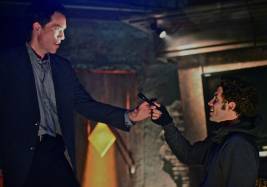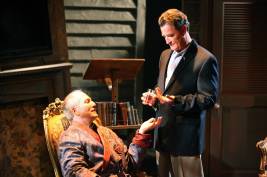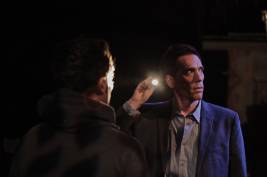
“There is a house in New Orleans
They call the Rising Sun
And it’s been the ruin of many a poor boy
And God I know I’m one”
The New Orleans mansion Trent Varro shares with his father Garrett and grandfather Bowen may indeed prove the ruin of Felix Martin, or so it would seem when the young Angelino catches sight of the shocking tableau which ends Act One of Tom Jacobson’s World Premiere drama House Of The Rising Son. (No, the last word isn’t misspelled.)
Running concurrently with (and right next door to) the playwright’s simultaneously World-Premiering The Chinese Massacre (Annotated), The House Of The Rising Son further cements Jacobson’s reputation as one of our finest L.A. talents, as it does those of its formidable director Michael Michetti, its all-around terrific cast of actors, and its sensational team of designers.
Paul Witten is Trent, a handsome 40ish parasitologist whose lecture on the tiny phorid fly, one of the world’s most horrifying predators, inspires both fascination and desire in Felix (Steve Coombs), the 20something fundraiser who cruises Trent throughout his lecture and ends up having sex with him in an open grave at the Hollywood Forever Cemetery only an hour or so later.
Sex At First Sight may be nothing out of the ordinary for hot, hunky Los Angeles gays in lust, but Trent’s impulsive invitation for Felix to come meet the family down New Orleans way does come as a bit of a shock to the UCLA grad with a Masters in Folklore. Still, Felix’s attraction to Trent is undeniable, and the notion of a trip to The Big Easy, one that coincides with a Tennessee Williams Literary Festival, proves equally irresistible.
Before you can say “beignets and chicory,” Trent and Felix have arrived chez Varro, the sight of Trent’s father Garrett (Patrick John Hurley) sending shivers down Felix’s spine. The 60ish man is a dead ringer for the khaki-clad specter the folklorist/ghost story collector spotted pre-coitus in Hollywood’s graveyard to the stars!
As for Granddaddy Bowen (Rod Menzies at the performance reviewed here), Felix takes an instant dislike to the foul-mouthed homophobe who seems to delight in spitting out things like “He takes it up the ass?” and “You shit in his little faggot mouth?” and “Faggot-pansy-cocksucker-pantywaist-queer.”
Even the attitudes of the apparently more open-minded Garrett rankle Felix, who takes issue with the older man’s “very outdated notions of what gay people—gay men—are like” and his inability to see that “the world has changed” and that it is now possible for men like Trent and Felix to build a future together out in the open. “My intention,” Felix explains, “whether it’s Trent or someone else—is to be with him. Just him.”
Despite its ghost story trappings, House Of The Rising Son is at its heart a serious (albeit highly entertaining) look at attitudes past and present regarding men who love men. As Trent explains, “Homosexuality only got a name a hundred years ago. It only became a movement between fifty and sixty years ago with the Mattachine Society. It only came out of the closet forty years ago with the Stonewall riots. It only garnered national sympathy almost thirty years ago with the advent of AIDS.”
House Of The Rising Son is sure to provoke much passionate post-performance discussion. As to just what will inspire such debate, this reviewer’s lips must remain sealed. Suffice it to say that Jacobson’s ambitious, audacious work (the same adjectives I used to describe The Chinese Massacre (Annotated)) puts gay marriage and the legalities of gay relationships in a historical context, at the same time presenting serious arguments in favor of homosexuality as an essential part of humankind, arguments which the playwright manages to link to the tiny phorid fly of Trent’s initial lecture.
Heady stuff indeed, yet not at all surprising coming from the writer of such unique stunners as Ouroboros, Bunbury, The Twentieth Century Way, and the dazzler I saw three times this past summer but whose title I can only synonymize as Devour The Shrimp for reasons known to the theatrical cognoscenti.
Having helmed both Ouroboros and The Twentieth Century Way, director Michetti proves the perfect choice to direct House Of The Rising Son, doing so with considerable panache. (A flashlight becomes a sexy flirtation aid in Michetti’s imaginative staging of the cemetery scene.)
Both Witten and Coombs create intelligent, passionate, richly detailed contemporary gay men, the former torn between tradition and modernity, the latter out-and-proud and disdainful of older generations’ lives lived in darkness. Both actors play dual roles, with Witten amusing as New Orleans cultural maven Maureen and Coombs dazzling as a sinewy, dangerous street hustler with a Creole accent so thick you could cut it with a couteau. Hurley does fine work too as a Dad(dy) with something to hide and as a Ghosts Of New Orleans tour organizer who looks like he could have stepped out of Oliver Twist. Finally, Menzies makes a strong impression as a cantankerous senior whose homophobia may not be all it appears to be, and as a flouncy, pink cocktail-swizzling tour guide.
Rising Son is a treat to the eyes and ears thanks to its crackerjack design team. Richard Hoover’s deliciously off-kilter set suggests decades if not centuries of decadence down New Orleans way, and anyone seated in the first row will have his or her feet in Louisiana earth (or a close equivalent). Jeremy Pivnick’s lighting design is stunningly varied and mood-setting, as are Bruno Louchouarn’s original music and sound design. Costume designer Christina Haatainen Jones has come up with a bevy of outfits from go-go shorts and boots to UCLA faculty chic to flamboyant gaywear to a Big-&-Tall woman’s suit for 6-footer Maureen. Lindsey Garrett’s properties get a big thumbs up as does Tracy Winters and Tuffet Schmelze’s dialect coaching.
Rebecca Cohn is production manager, Nicole Rossi stage manager, and Shaina Rosenthal assistant director and slideshow designer. (Major snaps for each of Trent’s vivid, informative, clever slideshows.)
House Of The Rising Son is at once an exciting addition to the “gay play” genre, and an exciting new play period, a highly original work in which gay themes are used to tell a human story that any broad-minded theatergoer will be able to identify with. Believe me; people will be talking about House Of The Rising Sun even as they keep their lips sealed about its many surprises.
I can keep a secret. Can you?
Ensemble Studio Theatre @ Atwater Village Theatre, 3269 Casitas Ave., Atwater Village.
www.ensemblestudiotheatrela.org
–Steven Stanley
April 28, 2011
Photos: Shane William Zweiner





 Since 2007, Steven Stanley's StageSceneLA.com has spotlighted the best in Southern California theater via reviews, interviews, and its annual StageSceneLA Scenies.
Since 2007, Steven Stanley's StageSceneLA.com has spotlighted the best in Southern California theater via reviews, interviews, and its annual StageSceneLA Scenies.







 COPYRIGHT 2024 STEVEN STANLEY :: DESIGN BY
COPYRIGHT 2024 STEVEN STANLEY :: DESIGN BY